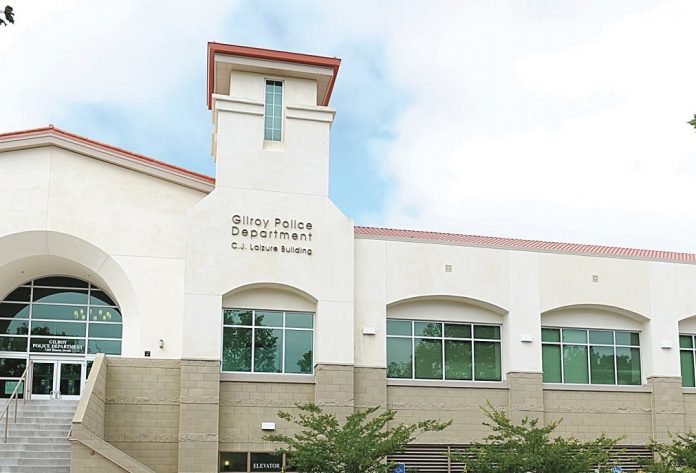In response to recent guidance from state officials amid the nationwide conversation about police reform, officers of the Gilroy Police Department will no longer use the carotid artery restraint as a submission technique when detaining uncooperative suspects.
Meanwhile, a group of local residents known as Gilroy Community Action on Policing (CAP) aims to work with the police department to seek ways to improve public safety and law enforcement accountability. The group has scheduled a press conference for June 18 to promote a “holistic” approach to public safety in Gilroy and encourage city and police officials to host a virtual town hall in the near future.
During the June 15 online Gilroy City Council meeting, Police Chief Scot Smithee said in a verbal report to the council that the police department will immediately “suspend” the use of the carotid restraint in the field. The technique has been approved as a use-of-force technique to subdue belligerent suspects in California for many years, and officers have been trained in how to use the hold.
Earlier this month, Gov. Gavin Newsom ordered state police training programs to stop training for the carotid restraint. And this week, Attorney General Xavier Becerra recommended that all police departments in California stop using the carotid restraint, among other guidance.
Smithee told the council that his suspension of the carotid restraint within the Gilroy department was in response to the recent statements from state officials.
The carotid restraint made the news in Gilroy when police used the technique on Steven Juarez in their attempt to arrest him on Chestnut Street Feb. 25, 2018. After an officer applied a carotid restraint, Juarez fell into medical distress and was pronounced dead by paramedics. The county medical examiner’s report does not say the technique was a factor in his death. Before applying the carotid hold, officers used Tasers and physical force to attempt to arrest Juarez but he continued to resist, according to authorities.
An investigation by the district attorney’s office said the officers acted legally in the arrest and use of force on Juarez.
Law enforcement authorities have described the carotid restraint as a last resort technique to arrest an uncooperative suspect. The restraint is not a chokehold, and when applied correctly it is intended to briefly restrict the flow of blood to the brain so the subject is rendered unconscious. It is not supposed to cut off or restrict the subject’s breathing.
Smithee did not mention the Juarez incident when discussing the carotid hold during the June 15 council meeting.
Eric Heiser, a member of Gilroy CAP, said his group is grateful to the Gilroy Police Department discontinuing use of the carotid restraint. A local ban on the hold is one of 19 reform proposals listed on their press release announcing the June 18 press conference.
However, Heiser noted that Smithee did not indicate that the carotid hold would be prohibited in Gilroy forever. Gilroy CAP would like to see the police department take reform measures more “proactively,” rather than as a response to direction from state authorities.
“We’re still a little wary because the language he used was (it was) ‘suspended,’” Heiser said. “We want a ban that will be forever.”
Gilroy resident Rebeca Armendariz, a cousin of Juarez’s, thinks the suspension of the carotid hold could save lives, but police and city officials need to do more.
“We’re really happy to hear it, but we have to struggle on until other changes are made. It’s not the only policy they need to change,” said Armendariz, a Gilroy City Council candidate who joined the CAP group shortly after it was formed in recent weeks.
The direction from Newsom and Becerra followed the May 25 death of George Floyd in police custody in Minneapolis. That death, which was caught on camera, sparked nationwide protests—including at least two recent events in Gilroy—and growing demands for widespread police reform.
It also led to the formation of the Gilroy CAP.
“We all want to see Gilroy be the best they can be,” said Heiser, a Gilroy native who is currently a college student at Columbia University. “One way we can do that is by helping to improve public safety. We want public safety to be the best it can be. We want to see positive change and reform in policing.”
The group has scheduled a press conference for 4:30pm June 18 outside the Gilroy Police Department. They will ask city officials to conduct a town hall “focusing on dialogue, listening to the community and accountability within the next week,” reads a press release from Gilroy CAP.
Smithee during the June 15 council report also discussed the “8 Can’t Wait” campaign. This movement lists eight policies that law enforcement agencies should enact to “reduce the harm caused by police in the short-term,” reads the website 8cantwait.org.
The city posted a response to the 8 Can’t Wait campaign on Facebook June 4. Smithee told the council June 15 that some of the eight policies are already in place while “some are easy to deal with, and some are a little more controversial and need more discussion.”
Gilroy CAP’s list of 19 police reform proposals for police include those promoted by 8 Can’t Wait. Others include “further elaboration” of the city’s peaceful demonstration policy, a civilian review board for citizen complaints against police, maintain and release disciplinary records for officers and establish a “duty to intervene” into a partner officer’s excessive use of force.
The death of George Floyd has also prompted law enforcement authorities throughout the nation to condemn the alleged excessive force used by the Minneapolis officers who arrested him. On June 1, Smithee wrote a message on social media about the Floyd incident, “As a law enforcement leader I am angered, disturbed and deeply saddened. The actions; and inactions, of the involved officers were criminal and reprehensible. This is not indicative of our values and fundamental duties as law enforcement officers.”














